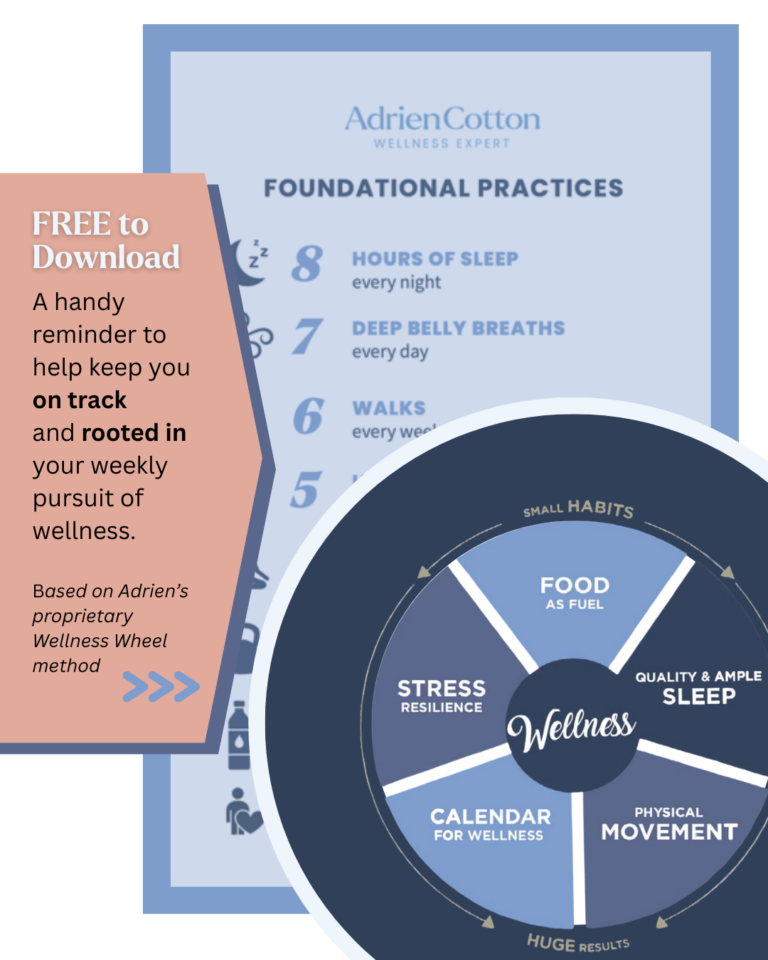If you looked at your credit card expenditures and bank statements, would they reflect what you deeply value in life? Are you – and your health and wellness – a value in which you invest? Last week, I began this 5-part series intended to help you determine if you are spending enough time or money on your wellness.

This week, my purpose is to help you view your investments – both in terms of time and money – as reflections of your core values and personal purpose. As part of my concierge wellness program and my 2022 Corporate Wellness Program, I especially enjoy facilitating conversations about how we can structure our calendars to align with our core values. I realize we all work 8, 9, 10+ hour days. I do too. Yet when I look at values I place high on my list, I have worked for ten years to ensure my decisions around my calendar reflect just that – what I value.
Another subject for another day is that I say “no” more than “yes.” Hey, I figure if it worked for Warren Buffet, it will work for me! (He famously said this.) And, I get my sleep – every night. When I discuss core values with my clients, things like authenticity, family, Faith, financial security, and community arise consistently. However, I can also spot it when a team member or a concierge member hasn’t aligned his or her calendar with their core values. Instead, the way they spend their time seems to match priorities or habits they have inherited from others or have perpetuated from an earlier time in life.
This is a deeper consideration of our “why” and purpose in life. Centering ourselves and spending our time – and resources – on what matters most brings a new lightness and clarity to our days.
“When you believe you are worthy of love, peace, joy, fulfillment, you become what you believe.” Oprah Winfrey
If we apply the same question to our financial decisions, would they also reflect what you deeply truly value? Do we make choices based on our values? Is wellness a value for you? Let’s start with what is a core value. I’ll draw from some of my descriptions from those whose names could even be synonymous with “core values” and “life’s purpose.”
A value is a way of being or believing that we hold most important. … We walk our talk—we are clear about what we believe and hold important, and we take care that our intentions, words, thoughts, and behaviors align with those beliefs. -Brené Brown
Personal leadership is the process of keeping your vision and values before you and aligning your life to be congruent with them. – Steven Covey
“I want to live a great impactful, purposeful life” – Tom Brady

For me, an individual with a set of core values and life purpose acts and makes decisions about (almost) everything from career and family to personal growth and wellness based on their values and purpose.
We live in a society where material achievement can often dictate self-worth. Add to that the number on the scale and the dress size, and none seem to “measure” to our liking. There is a belief system called the scarcity myth – which cultivates the principle that the more we have, the more we want.
The mindset that we don’t have often enough comes even before we think. It can become habit. It drips into every aspect of our life and self-talk. Scarcity is so toxic that we often eventually have what is called a “deficit relationship with ourselves.” It is the source of so much suffering. Imagine a world where we all count our many blessings every day?
“Understanding that you are not defined by your material belongings and awareness that everything that comes into your life is something you attracted.” – Caroline Myss
Here lies the issue. If our measurement tool is always around “not enough” and we have $99 online fitness and diet programs funded with multi-million dollar marketing campaigns crushing it in the marketplace, then it’s no wonder many “bargain” their way into a fitness and “diet” program. If we are always looking outward at what we value – what others have – also known as comparison syndrome – then we may not be spending our dollars and time on what we most value.
Many people see themselves in how they handle money. It is a mainstay behind their identity. If this is the case, is it coming from what they deeply value, or was this identity inherited? When it comes to wellness, I know the brain loves to turn to numbers to compute. So it is no surprise I hear almost daily about “how many calories” or “how many steps” I am “supposed” to eat/walk. Yet when we value our worth by a number, it can lead to trouble.
If you could just repeat, “I am not my salary, my weight, my dress size, my house value, etc., I am (your name) who __________ (fill in the blank).” I say define yourself not by how much a true value costs but by how much it will contribute to who you are.
“Just be yourself. Be all of you.”- Jack Canfield
So when it comes time for you to think through what you want from your wellness, start first with what you value most. Then ask yourself: “Are the things I’m spending my precious time and hard-earned money on aligned with my values?”
Stay tuned for part 3 of this series next week, where we discuss the cost and value of your diet and exercise programs. For more information about our programs, visit https://adriencotton.com/corporate-wellness/ or email me if you’d like to discuss how I can help you or your team develop your very own wellness practice.



